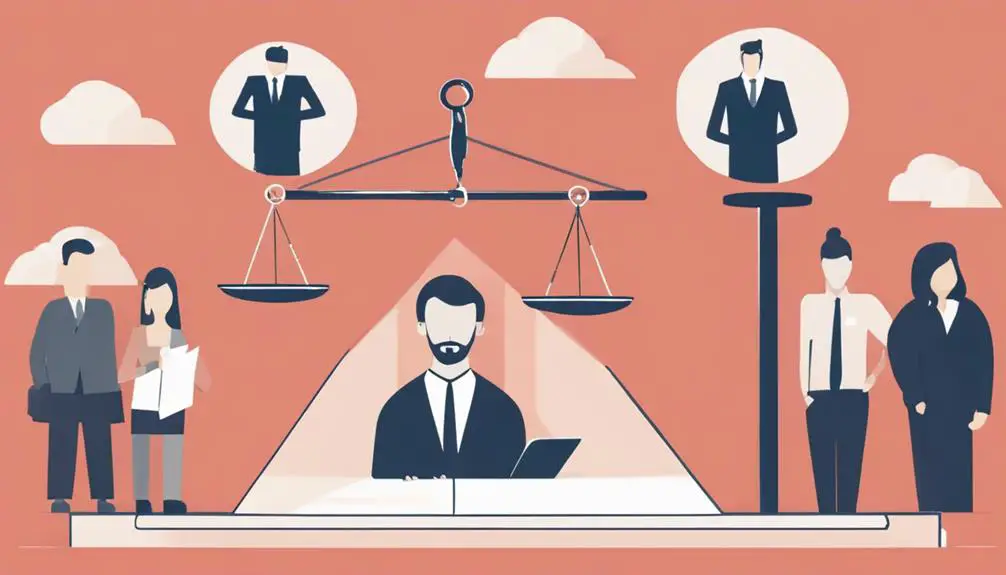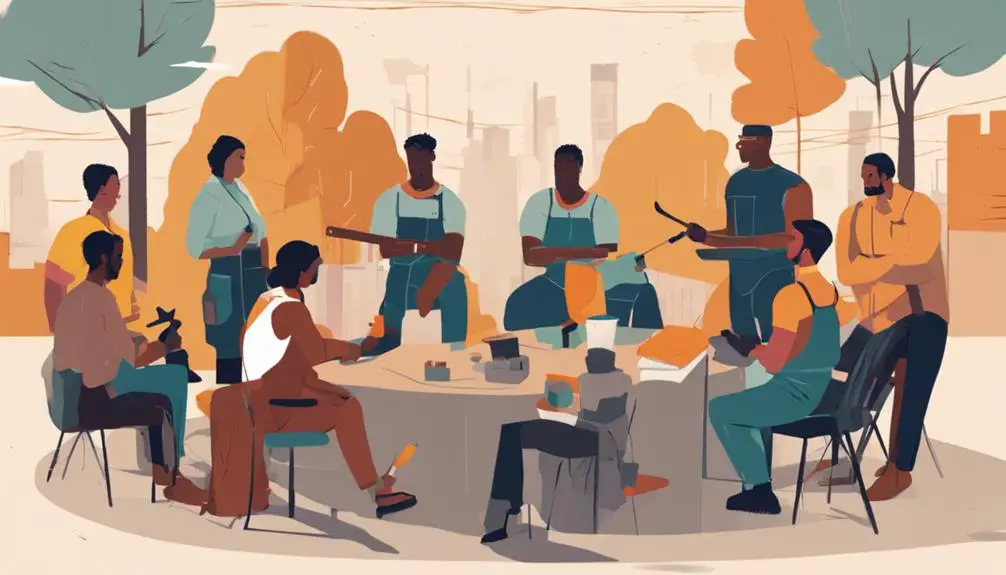This exploration of unemployment as a moral issue versus a societal challenge invites readers to rethink the nature of work and sin.

Is Unemployment a Sin?
Just as Dante traversed the circles of Hell, you might find yourself navigating the complex layers of unemployment. It's a realm where societal norms and personal beliefs often clash, leaving you to ponder whether being without a job is merely an unfortunate circumstance or, as some might argue, a moral failing.
By examining the historical and religious contexts, alongside the very real effects on individuals and communities, you're invited to explore this multifaceted issue. What you uncover may challenge your preconceived notions about work, worth, and sin, urging you to reconsider what it means to be productive in today's society.
Key Takeaways
- Unemployment is not considered a sin in many religious teachings.
- Compassion and support for the unemployed are emphasized across faiths.
- Work is viewed as fulfilling divine purpose, beyond just employment.
- Society should ensure opportunities for everyone to contribute meaningfully.
Defining Unemployment

Unemployment, a condition often characterized by an individual's lack of engagement in gainful employment, raises significant ethical and economic questions within society. You might find yourself pondering the ethical dimensions of joblessness, especially when examining jobless statistics. These figures aren't just numbers; they represent real people facing real challenges.
Economic theories provide a framework for understanding the causes and consequences of unemployment, offering insights into its impact on society's moral fabric.
From an ethical standpoint, the question isn't just about the individual's role in their own unemployment but also about society's responsibility to address these issues. Economic theories, such as Keynesian economics, suggest that unemployment isn't merely a result of individual failure but can also stem from broader economic fluctuations and failures in policy. This perspective encourages you to consider the structural aspects of unemployment, recognizing that jobless statistics reflect systemic issues as much as personal circumstances.
Thus, understanding unemployment requires delving into both its economic underpinnings and its ethical implications. It's a complex interplay of individual actions and societal structures, where economic theories and jobless statistics offer crucial insights into a phenomenon that affects the well-being of individuals and communities alike.
Religious Perspectives
Exploring the ethical dimensions of joblessness further, various religious traditions offer unique insights into the moral considerations surrounding unemployment. You'll find that most faiths don't cast a direct moral judgment on the state of being unemployed. Instead, they often emphasize the importance of striving towards a divine purpose, which can manifest in myriad forms beyond traditional employment.
From a religious perspective, the value of work isn't solely in earning a living but in fulfilling a part of one's divine purpose. This purpose might be caring for a family, volunteering for the betterment of the community, or pursuing personal development that contributes to the greater good. Therefore, unemployment itself isn't seen as a sin, but the intentional refusal to contribute to society in any form might be viewed through a critical ethical lens.
Moreover, many religious teachings encourage compassion and support for those who are struggling, including the unemployed. This viewpoint suggests that societal structures should aim to provide opportunities for all to find meaningful ways to contribute, aligning with their divine purpose. The emphasis is on understanding, assistance, and the collective responsibility to ensure that everyone can fulfill their potential, rather than casting judgment on individuals' employment status.
Societal Impacts

The ripple effects of unemployment extend beyond individual struggles, impacting societal cohesion and economic stability. When you examine the broader picture, it's clear that high unemployment rates can erode the social fabric of communities, leading to increased crime rates, social unrest, and a decline in overall quality of life. These outcomes aren't just abstract concepts; they're real issues that affect real people every day.
From an economic standpoint, the consequences of unemployment are equally dire. Reduced consumer spending, lower tax revenues, and increased demand for social services strain public budgets and limit economic growth. You're faced with a cycle that's hard to break: unemployment leads to reduced economic activity, which in turn leads to more unemployment.
The policy implications are significant. Addressing unemployment isn't just about providing temporary relief to those out of work; it's about implementing strategic measures that foster sustainable economic growth and job creation. You're tasked with considering how policies such as education and training programs, tax incentives for businesses, and investments in infrastructure can play pivotal roles in mitigating the adverse effects of unemployment on society.
In essence, tackling unemployment is crucial not just for the well-being of individuals, but for the health and prosperity of society as a whole.
Personal Stories
While addressing the societal implications of unemployment is essential, it's equally important to consider how this issue affects individuals through their personal stories. You've likely observed or experienced firsthand the emotional toll that comes with being unemployed. It isn't just about the loss of a paycheck; it's about the erosion of self-worth and identity that often accompanies this status. In navigating these turbulent waters, individuals deploy various job seeking strategies with the hope of regaining not only employment but also a sense of purpose.
Your narrative is punctuated by tales of emotional resilience, a quality that shines brightly against the backdrop of uncertainty. This resilience isn't innate; it's cultivated through the highs and lows of the job-seeking journey. You understand that rejection isn't a reflection of your value as a person but rather a step towards finding the right fit. This mindset shift is crucial, as it transforms the job search from a daunting task into an opportunity for growth and self-discovery.
In analyzing these personal stories, it's clear that the journey through unemployment is as much about developing emotional resilience as it's about employing effective job seeking strategies. These narratives underscore the complexity of unemployment, highlighting that it's a multifaceted issue requiring compassionate understanding and robust support systems.
Rethinking Work Values

Rethinking work values necessitates a deep dive into what we regard as essential and rewarding in our professional lives. Traditionally, a strong work ethic has been synonymous with long hours and unyielding dedication, often at the expense of personal well-being. However, it's crucial to question whether this conventional definition aligns with true career fulfillment.
Analyzing work ethic through an ethical lens, it's apparent that fulfillment shouldn't solely derive from the quantity of work but rather its quality and impact. This perspective encourages you to prioritize tasks that not only contribute to the organization's success but also to your personal growth and satisfaction.
Furthermore, redefining career fulfillment involves recognizing the importance of work-life balance. It's ethical to consider your well-being as a fundamental component of your professional success. Engaging in work that resonates with your values and allows for personal time fosters a healthier, more sustainable work ethic.
Frequently Asked Questions
How Does the Concept of Unemployment Vary Across Different Cultures and Historical Periods?
You'll find that the concept of unemployment varies widely across cultures and historical periods, shaped by cultural stigmas and historical employment practices. It's a complex issue, deeply influenced by societal norms and economic conditions.
Can Being Voluntarily Unemployed for Personal Growth or Exploration Be Justified Ethically or Spiritually?
You can ethically justify voluntary unemployment for personal growth or exploration. Practices like voluntary simplicity and spiritual retreats often necessitate stepping away from work, fostering deeper self-understanding and contributing to one's spiritual and ethical development.
What Are the Psychological Effects of Long-Term Unemployment on Individuals Outside the Realm of Financial Stability?
Long-term unemployment often leads to mental health decline and social isolation. You'll likely experience increased stress, depression, and feel cut off from society, which can severely impact your overall well-being and personal relationships.
How Do Advancements in Technology and the Rise of AI Impact the Traditional Understanding of Employment and Unemployment?
Advancements in technology and AI challenge traditional employment views, raising questions about automation ethics and workforce displacement. You'll need to consider how these changes ethically impact society and the future of our workforce.
What Role Do Governments Play in Shifting the Stigma Around Unemployment, and What Policies Can Be Implemented to Support Those Between Jobs More Effectively?
Governments can shift unemployment stigma by promoting labor market flexibility and strengthening social safety nets. Implementing comprehensive policies ensures you're supported during job transitions, fostering an ethical approach to navigating the evolving employment landscape.
Conclusion
In examining unemployment through religious, societal, and personal lenses, it's clear it can't be simplistically labeled as a sin. Such a perspective overlooks the complex factors at play, including economic systems and personal circumstances.
Ethically, it's crucial to reassess work values, recognizing the inherent dignity of every individual beyond their employment status.
Ultimately, a more compassionate and nuanced understanding of unemployment challenges us to foster a society that values people for who they are, not just the work they do.



Sign up